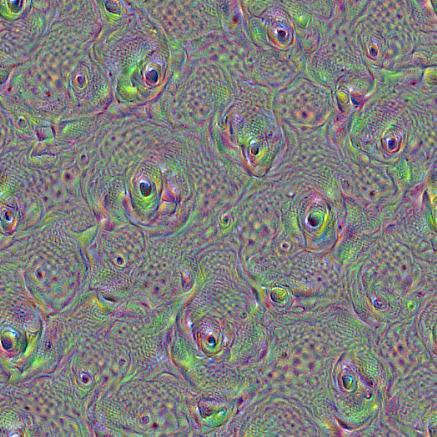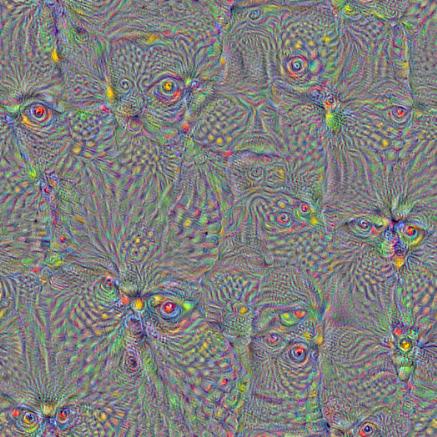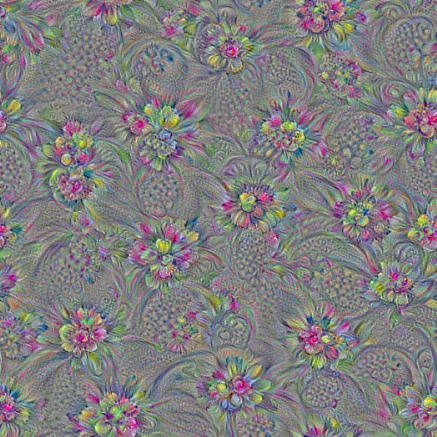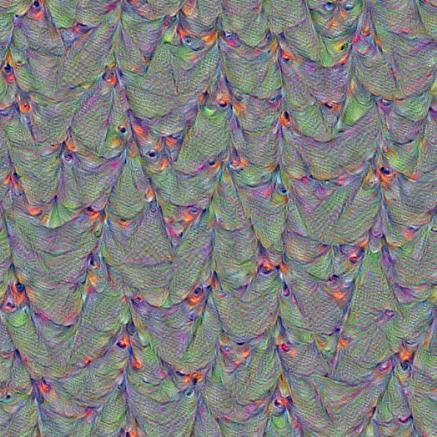机器学习:DeepDreaming with TensorFlow (二)
在前面一篇博客里,我们介绍了利用TensorFlow 和训练好的 Googlenet 来生成简单的单一通道的pattern,接下来,我们要进一步生成更为有趣的一些pattern,之前的简单的pattern都是基于单一通道,单一尺度的,现在我们来试试多尺度下生成的pattern
# 这部分代码和之前单一通道的一样
# boilerplate code
from __future__ import print_function
import os
from io import BytesIO
import numpy as np
from functools import partial
import PIL.Image
from IPython.display import clear_output, Image, display, HTML
import tensorflow as tf
# !wget https://storage.googleapis.com/download.tensorflow.org/models/inception5h.zip && unzip inception5h.zip
model_fn = 'tensorflow_inception_graph.pb'
# creating TensorFlow session and loading the model
graph = tf.Graph()
sess = tf.InteractiveSession(graph=graph)
with tf.gfile.FastGFile(model_fn, 'rb') as f:
graph_def = tf.GraphDef()
graph_def.ParseFromString(f.read())
t_input = tf.placeholder(np.float32, name='input') # define the input tensor
imagenet_mean = 117.0
t_preprocessed = tf.expand_dims(t_input-imagenet_mean, 0)
tf.import_graph_def(graph_def, {'input':t_preprocessed})
layers = [op.name for op in graph.get_operations() if op.type=='Conv2D' and 'import/' in op.name]
feature_nums = [int(graph.get_tensor_by_name(name+':0').get_shape()[-1]) for name in layers]
print('Number of layers', len(layers))
print('Total number of feature channels:', sum(feature_nums))
# Picking some internal layer. Note that we use outputs before applying the ReLU nonlinearity
# to have non-zero gradients for features with negative initial activations.
layer = 'mixed4d_3x3_bottleneck_pre_relu'
channel = 64
# start with a gray image with a little noise
img_noise = np.random.uniform(size=(224,224,3)) + 100.0
# Multiscale image generation
# 多尺度图像的生成
def tffunc(*argtypes):
# Helper that transforms TF-graph generating function into a regular one.
# See "resize" function below.
placeholders = list(map(tf.placeholder, argtypes))
def wrap(f):
out = f(*placeholders)
def wrapper(*args, **kw):
return out.eval(dict(zip(placeholders, args)), session=kw.get('session'))
return wrapper
return wrap
# Helper function that uses TF to resize an image
def resize(img, size):
img = tf.expand_dims(img, 0)
return tf.image.resize_bilinear(img, size)[0,:,:,:]
resize = tffunc(np.float32, np.int32)(resize)
def calc_grad_tiled(img, t_grad, tile_size=512):
# Compute the value of tensor t_grad over the image in a tiled way.
# Random shifts are applied to the image to blur tile boundaries over
# multiple iterations.
sz = tile_size
h, w = img.shape[:2]
sx, sy = np.random.randint(sz, size=2)
img_shift = np.roll(np.roll(img, sx, 1), sy, 0)
grad = np.zeros_like(img)
for y in range(0, max(h-sz//2, sz),sz):
for x in range(0, max(w-sz//2, sz),sz):
sub = img_shift[y:y+sz,x:x+sz]
g = sess.run(t_grad, {t_input:sub})
grad[y:y+sz,x:x+sz] = g
return np.roll(np.roll(grad, -sx, 1), -sy, 0)
# octave_n 表示阶数
# octave_scale 表示尺度变化的倍数
def render_multiscale(t_obj, img0=img_noise, iter_n=10, step=1.0, octave_n=3, octave_scale=1.4):
t_score = tf.reduce_mean(t_obj) # defining the optimization objective
t_grad = tf.gradients(t_score, t_input)[0] # behold the power of automatic differentiation!
img = img0.copy()
for octave in range(octave_n):
if octave>0:
hw = np.float32(img.shape[:2])*octave_scale
img = resize(img, np.int32(hw))
for i in range(iter_n):
g = calc_grad_tiled(img, t_grad)
# normalizing the gradient, so the same step size should work
g /= g.std()+1e-8 # for different layers and networks
img += g*step
print('.', end = ' ')
clear_output()
showarray(visstd(img))
render_multiscale(T(layer)[:,:,:,channel])
看看一些生成的效果图:
layer = ‘mixed4d_3x3_bottleneck_pre_relu’
channel = 100
octave_n=4, octave_scale=1.25
layer = ‘mixed4d_3x3_bottleneck_pre_relu’
channel = 60
octave_n=4, octave_scale=1.25
layer = ‘mixed4d_3x3_bottleneck_pre_relu’
channel = 139
octave_n=4, octave_scale=1.25
layer = ‘mixed4b_3x3_bottleneck_pre_relu’
channel = 24
octave_n=4, octave_scale=1.25
参考来源:
机器学习:DeepDreaming with TensorFlow (二)的更多相关文章
- 机器学习: DeepDreaming with TensorFlow (一)
在TensorFlow 的官网上,有一个很有趣的教程,就是用 TensorFlow 以及训练好的深度卷积神经(GoogleNet)网络去生成一些有趣的pattern,通过这些pattern,可以更加深 ...
- ng机器学习视频笔记(二) ——梯度下降算法解释以及求解θ
ng机器学习视频笔记(二) --梯度下降算法解释以及求解θ (转载请附上本文链接--linhxx) 一.解释梯度算法 梯度算法公式以及简化的代价函数图,如上图所示. 1)偏导数 由上图可知,在a点 ...
- 机器学习之支持向量机(二):SMO算法
注:关于支持向量机系列文章是借鉴大神的神作,加以自己的理解写成的:若对原作者有损请告知,我会及时处理.转载请标明来源. 序: 我在支持向量机系列中主要讲支持向量机的公式推导,第一部分讲到推出拉格朗日对 ...
- Google机器学习课程基于TensorFlow : https://developers.google.cn/machine-learning/crash-course
Google机器学习课程基于TensorFlow : https://developers.google.cn/machine-learning/crash-course https ...
- Andrew Ng机器学习课程笔记(二)之逻辑回归
Andrew Ng机器学习课程笔记(二)之逻辑回归 版权声明:本文为博主原创文章,转载请指明转载地址 http://www.cnblogs.com/fydeblog/p/7364636.html 前言 ...
- 机器学习:DeepDreaming with TensorFlow (三)
我们看到,利用TensorFlow 和训练好的Googlenet 可以生成多尺度的pattern,那些pattern看起来比起单一通道的pattern你要更好,但是有一个问题就是多尺度的pattern ...
- ML.NET 发布0.11版本:.NET中的机器学习,为TensorFlow和ONNX添加了新功能
微软发布了其最新版本的机器学习框架:ML.NET 0.11带来了新功能和突破性变化. 新版本的机器学习开源框架为TensorFlow和ONNX添加了新功能,但也包括一些重大变化, 这也是发布RC版本之 ...
- 机器学习算法总结(十二)——流形学习(Manifold Learning)
1.什么是流形 流形学习的观点:认为我们所能观察到的数据实际上是由一个低维流行映射到高维空间的.由于数据内部特征的限制,一些高维中的数据会产生维度上的冗余,实际上这些数据只要比较低的维度就能唯一的表示 ...
- Python3实现机器学习经典算法(二)KNN实现简单OCR
一.前言 1.ocr概述 OCR (Optical Character Recognition,光学字符识别)是指电子设备(例如扫描仪或数码相机)检查纸上打印的字符,通过检测暗.亮的模式确定其形状,然 ...
随机推荐
- [PostgreSQL] Use Foreign Keys to Ensure Data Integrity in Postgres
Every movie needs a director and every rented movie needs to exist in the store. How do we make sure ...
- linux下如何获取每个线程的CPU占用率
啥也不说,直接上脚本: root@Storage:/mnt/mtd# cat cpu.sh #!/bin/sh while truedo ps -H -eo user,pid,ppid, ...
- maven打包到本地库
mvn install:install-file -DgroupId=com.alipay -DartifactId=com.alipay.core -Dversion=20180104135026 ...
- [Angular Unit Testing] Shallow Pipe Testing
import { TestBed, ComponentFixture } from '@angular/core/testing'; import { BrowserDynamicTestingMod ...
- 使用Nexus搭建Maven仓库
1.目的 通过建立自己的私服,能够减少中央仓库负荷.节省外网宽带.加速maven构建.自己部署构件等,从而高效的使用maven,nexus是当前流行的Maven仓库管理软件. 2.下载nexus 2. ...
- 伸展树(splay tree)
伸展树的设计思路,鉴于数据访问的局部性(28原则)在实际应用中普遍存在,将按照"最常用者优先"的启发策略.尽管在最坏情况下其单次操作需要 O(n) 时间,但分摊而言仍然 O(log ...
- [Postgres] Create a Postgres Table
Learn how to create a table using the most widely-used data types (serial, varchar, integer, float, ...
- HDU 4870 Rating 高斯消元法
链接:http://acm.hdu.edu.cn/showproblem.php?pid=4870 题意:用两个账号去參加一种比赛,初始状态下两个账号都是零分,每次比赛都用分数低的账号去比赛.有P的概 ...
- 小米再迎两位重量级人才,原亦庄国投CEO王晓波入职产投部(产业嗅觉)
集微网消息,在小米进入上市倒计时阶段,雷军继续在产业链吸纳人才.日前,小米又迎来了两位重量级人才. 一位投资界重量级人才王晓波,他曾任著名产业投资基金亦庄国投总经理.据悉,王晓波加入的部门是小米产投部 ...
- 微信小程序开发实战视频教程发布
昨日(9月23),腾讯终于发布了没有APPid,无需申请也可以进行微信小程序开发的视频教程了,我在在第一时间尝试并发布了这7个小视频教程,入门足够了.... 各位免费拿去,慢慢享用: 链接: http ...




